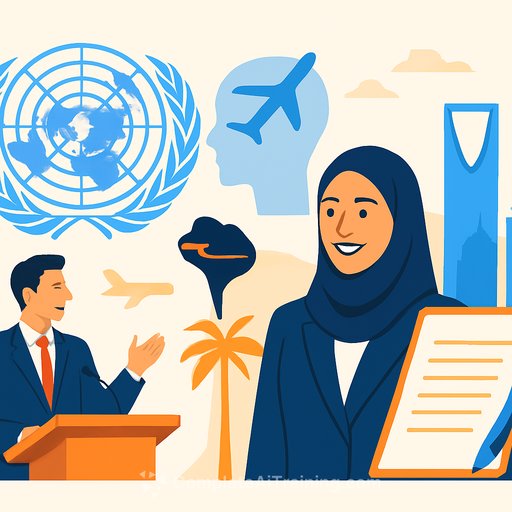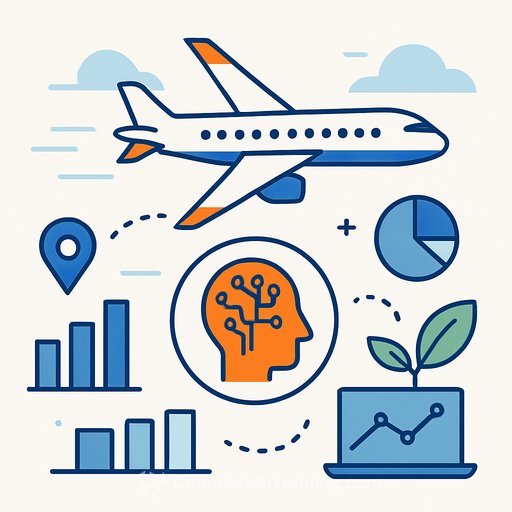UN Tourism sets an AI agenda: what Riyadh means for hospitality and events
UN Tourism closed its biggest General Assembly yet in Riyadh, with delegations from 148 Member States, including 90 Tourism Ministers and 70 Ambassadors. The outcome is clear: AI and digital innovation will steer policy, funding, and capability-building across the sector.
Alongside program milestones, Member States agreed on a shared roadmap to grow inclusively, build resilience, and support local communities with practical digital tools and AI. For operators, venues, and event planners, this signals where budgets, training, and partnerships are heading next.
Why this matters for your business
- Expect stronger support for digital infrastructure: connectivity, data systems, and tools that cut wait times, reduce no-shows, and lift ancillary spend.
- Policy focus on skills: addressing staffing gaps with AI-assisted scheduling, training, and service delivery.
- Local impact is a priority: procurement and guest experiences that include community-led products and SMEs, supported by tech.
- Accessibility and inclusivity: multilingual assistance, adaptive content, and frictionless booking and check-in.
Inside the AI session: signals from leaders
A dedicated session on the impact of AI brought together public and private leaders, with contributions from more than 30 Heads of Delegation. Speakers included representatives from Amadeus, Trip.com, Microsoft, and the World Economic Forum, reflecting strong industry-government alignment.
The UN Tourism Artificial Intelligence Challenge named Smart Tour (Brazil) as the overall winner, a nod to practical solutions improving guest experience and operations.
Riyadh Declaration: what to expect next
Member States announced the Riyadh Declaration on the Future of Tourism, a roadmap that prioritizes collaboration, resilience, and community empowerment through digital tools and AI. For hospitality and events teams, here's how that translates on the ground:
- Investment incentives for digital upgrades: booking pipelines, POS, CRM/CDP, and guest data flows that enable real-time decisions.
- Workforce development: targeted training to close skills gaps in operations, service, and analytics.
- Support for entrepreneurs: programs and pilots that connect hotels, venues, and DMCs with local tech and experience providers.
Leadership and global footprint
Shaikha Al Nowais was confirmed as the next Secretary-General of UN Tourism, becoming the first woman to lead the agency. Her term begins in early 2026.
The General Assembly also approved the UN Tourism Africa & Americas Summit as a permanent biennial platform and created a Mechanism for South-South Cooperation. A new Regional Office in Shanghai was approved, expanding on-the-ground coordination.
Dates to note
- World Tourism Day 2026: "Digital Agenda and Artificial Intelligence" (host: El Salvador).
- World Tourism Day 2027: "Transforming Tourism through Education" (host: Cabo Verde).
- 27th UN Tourism General Assembly: Dominican Republic.
What to do now: a practical checklist for hospitality and events teams
- Audit your guest journey for delays and drop-offs. Prioritize fixes where AI can help immediately: demand forecasting, dynamic packaging, queue reduction, and multilingual support.
- Pilot one frontline use case in 90 days: AI concierge, RFP triage for venues, or staff rostering linked to forecasted footfall and event schedules.
- Standardize your data. Clean reservations, PMS, POS, ticketing, and CRM data so AI tools produce reliable outcomes.
- Upskill your team. Start role-based training for revenue, ops, sales, and marketing. See curated options by job at Complete AI Training or browse the latest AI courses.
- Build local partnerships. Co-create itineraries and experiences with community businesses, backed by simple digital tooling for inventory, payments, and reviews.
- Set guardrails. Establish data privacy, guest consent, and bias checks for any AI-driven service that touches pricing, offers, or content.
The bigger picture
UN Tourism marked 50 years by setting a clear direction: help innovators thrive and help Member States use AI to diversify tourism, grow inclusively, and widen opportunity. For operators, this is a mandate to modernize without losing the human touch that guests remember.
To follow updates and policy tools, visit UN Tourism.
About UN Tourism
UN Tourism, a United Nations specialised agency, is the leading international body promoting responsible, sustainable, and accessible tourism. Its membership includes 166 countries, 6 territories, 2 permanent observers, and 500+ Affiliate Members from the private sector.
Your membership also unlocks:






